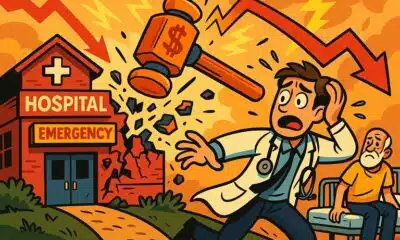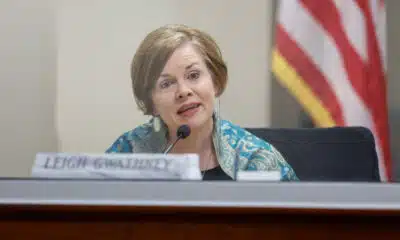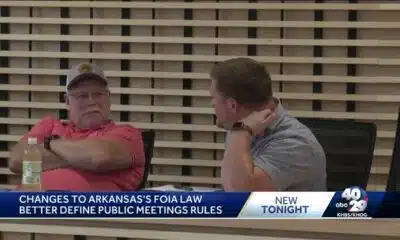Kaiser Health News
An Arm and a Leg: To Get Health Insurance, This Couple Made a Movie
Dan Weissmann
Thu, 30 Nov 2023 10:00:00 +0000
Last fall, Ellen Haun and Dru Johnston were hustling to get their health insurance sorted out for 2023. The Hollywood couple are members of SAG-AFTRA, the union representing actors and writers. Members have to earn about $26,000 a year on union projects to be eligible for union insurance.
And Haun was about $800 short.
When she couldn’t book the gigs she needed, Haun, with husband Johnston’s help, came up with a plan: to crowdfund enough money to make their own movie starring Haun, called “Ellen Needs Insurance.”
In this episode of “An Arm and a Leg,” host Dan Weissmann speaks with Haun and Johnston about their short film, how they were affected by the 2023 SAG-AFTRA strike, and their ongoing quest to stay insured.
Dan Weissmann
Host and producer of “An Arm and a Leg.” Previously, Dan was a staff reporter for Marketplace and Chicago’s WBEZ. His work also appears on All Things Considered, Marketplace, the BBC, 99 Percent Invisible, and Reveal, from the Center for Investigative Reporting.
Credits
Emily Pisacreta
Producer
Adam Raymonda
Audio wizard
Ellen Weiss
Editor
Click to open the Transcript
Transcript: To Get Health Insurance, This Couple Made a Movie
Note: “An Arm and a Leg” uses speech-recognition software to generate transcripts, which may contain errors. Please use the transcript as a tool but check the corresponding audio before quoting the podcast.
Dan: Hey there. OK, here’s something I never expected to say — I’ve got a funny, kind of sweet story about health insurance. OK, maybe sweet and sour. Here it is …
As we record this, it’s November, which means it’s open enrollment for lots of people — time to get next year’s health insurance figured out, both on the Obamacare exchanges and at lots of workplaces. A year ago, Ellen Haun and her husband Dru Johnston were HUSTLING to get their health insurance set up for 2023. In the most creative possible way … by crowdfunding a creative project. They posted a video of course.
Ellen: Hi, I’m Ellen, and I need health insurance.
Dru: And I’m Dru, and I also need health insurance.
Dan: Ellen and Dru work in Hollywood — acting and writing — and folks in that industry get their insurance through the unions. But only if they’ve racked up enough wages for union work over a 12-month period. They’d been on Ellen’s insurance through the actors’ union, SAG. But last fall, as they explained in their crowdfunding video, that union insurance wasn’t looking like a sure thing for the coming year.
Dru: Right now, Ellen is $804 short. So we’re making a short film.
Ellen: And that short film is called “Ellen Needs Insurance.”
Dan: The video outlined their plan: to employ not just Ellen but other actors who also needed a little help getting over the finish line to qualify.
Dru: Also, which brings up the next point, are you an actor that’s close to hitting your health insurance? Then please get in touch.
Ellen: Yes, we want to cast you. We want you to have insurance.
Dru: And if we raise more money than our goal, we will use all of that only
towards casting more actors and getting them insurance.
Ellen: We’ll add parts. We don’t care.
Dru: Yeah, this isn’t Shakespeare. This is a script we wrote. We’ll add parts.
Ellen: We can … We’ll make them up.
Dan: That was a year ago. And spoiler: They did make the film. Of course now they need insurance for 2024. And Ellen’s union spent a lot of 2023 on strike, which has narrowed down the opportunities to earn that insurance again. So… I wanted to talk with them!
[“An Arm and a Leg” theme music plays.]
This is “An Arm and a Leg” — a show about why health care costs so freaking much, and what we can maybe do about it. I’m Dan Weissmann. I’m a reporter, and I like a challenge.
So the job we’ve picked here is to take one of the most enraging, terrifying, depressing parts of American life, and bring you something entertaining, empowering and useful.
[“An Arm and a Leg” theme music ends.]
Ellen and Dru met at a wedding.
Ellen: I was friends with the bride and Drew was friends with the groom. And at the bachelorette party, Emily had been, like, talking about all the single guys that were going to be at the wedding, but she had forgot to include Dru on that list. So I was like, just, I was like, why is this guy talking to me so much? He’s probably got a girlfriend somewhere.
Dru: Turns out I didn’t. And then, uh, we ended up, uh, starting to date almost immediately after that wedding.
Dan: By then, Ellen was earning enough as an actor to qualify for health insurance, starting with an ad for Xfinity Internet and a recurring role as a law student on “How to Get Away with Murder.”
Viola Davis: Ms. Chapin, can you tell us what the Fifth Amendment is?
Ellen: The Fifth Amendment? Um, right.
It, um, assures your right to protection from self incrimination.
Viola Davis: Are you asking me?
Ellen: No, that’s my answer.
Viola Davis: And it’s a correct one.
Dan: Getting that insurance was a big professional milestone. More than 85 percent of SAG members do not book enough union work to qualify– it takes about 26 thousand dollars across a one-year period. (And, you know, of course most actors, Ellen included, pick up other work on the side, or even hold down a day job.) For most of the last few years, Ellen had no worries about making enough money to qualify for insurance. She’d been getting paid for a commercial that ran and ran, because it was so terrific. You may have seen it. Even I have seen it … and I kinda never watch TV. Ellen plays BOTH parts in it. She’s call center employee
Claire in Phoenix: This is Claire in Phoenix, can I help you?
Dan: And she’s a woman who’s dialed in for customer support.
Ellen as customer: Yes.
Claire in Phoenix: Great.
Ellen as customer: Correct.
Claire in Phoenix: Ma’am. This isn’t an automated computer.
Ellen as customer: Operator?
Claire in Phoenix: Ma’am? I’m here. I’m live.
Ellen as customer: Wait, you’re real?
Claire in Phoenix: Yeah! With Discover Card, you can talk to a real person.
Dan: Ellen had been getting a “holding fee” — to keep her from auditioning for commercials for competitors.
Ellen: And I kind of knew in the back of my mind that like, okay, eventually this holding fee is going to go away because this commercial isn’t running anymore.
Dan: And then last June, she got the call.
Ellen: My agent was like, Hey, they’re releasing you from the holds. Uh, you’re not getting that payment. You, um, you’re free to audition for other commercials.
And I was like, okay, but what about that health insurance?
Dan: This was in June. She needed to make another 6 thousand dollars, by the end of December, to keep her insurance.
Ellen: And I thought, okay, I’ve got half the year. Like that’s just booking like one other commercial.
Dan: But that wasn’t a sure thing. She’d done it for years and years, but she wanted to hedge her bets. She experimented with working as an extra.
Ellen: And I was getting like, pretty consistent work, but also background work does not pay very well.
Dan: $187 a day. More if there’s overtime, but still. It’s not that it’s not that much, especially if you’re trying to chip away at like a 6,000 balance.
I was like, I don’t know if I’m going to make this, um, I knew that it was definitely going to be down to the wire. So that’s when I was like, you know what, maybe we should think about making a movie about this.
Dan: Actually, this was an idea that had kind of been on Dru’s shelf for a few years. As a comedy writer for a TV talk show, Dru had gotten his insurance from the screenwriter’s union, the WGA. And then in 2018 the show got canceled. Lucky for Drew, he was married to Ellen by then, so they put him on her SAG insurance. And then after that saga had ended, he had a fun idea.
Dru: I was like, oh, you know what I should have done is I should have just made a web series called, “Dru Needs Insurance.” And then I was like, well, it’s too late. I guess that’s an idea that I’m never going to have to do. And then flash forward.
Dan: They’re in the same boat! all over again.
Except now, it’s Ellen who’s short, and nothing to fall back on. I asked if they remembered the day when they decided to try making the film. Dru was like, …
Dru: It was in the OBGYN’s office.
Dan: Yeah. They were pregnant! This was the first doctor visit.
Dru: We had gone to the ultrasound. We saw the baby. We heard the heartbeat. We were like, well, that we were having the baby. It’s coming.
Dan: Now they were gonna see the doctor, talk about next steps.
Dru: And we had about 20 minutes in that waiting room, just sitting there kind of going like, okay, our life’s gonna change.
We got to make some, some choices, or we got to, like, figure out, like, what room are we going to use? All that stuff. But also in the middle of that, we were like, oh, also our health insurance is going … is set to run out.
Dan: Actually, it was going to run out exactly one month before the baby’s due date.
Dru: And I was like, well, shit, we need that health insurance. Um, and, and that’s when Ellen said, I think I need to make a movie and we need to do that.
Dan: So they did! They banged out a script — and brought a friend’s production company on board. (The union doesn’t let you just pay yourself directly.) Which brings us to the point in the story when they made that crowdfunding video
[Bouncy music plays in the background.]
Dru: It’s a comedy about an actress named Ellen, and the things she does to get insurance.
Ellen: Things like begging my agent for a job, praying to the gods for a surprise residual check, and even background work.
Also, the movie’s just about how hard it is to navigate insurance in this country.
[Bouncy music ends.
Dan: How’d it come out? That’s next.
This episode of “An Arm and a Leg” is produced in partnership with KFF Health News. That’s a nonprofit newsroom covering health care in America. Their journalism is terrific– wins all kinds of awards every year– and I’m honored to work with them.
Dan: So, Ellen and Dru did raise the money: more than 33 thousand dollars. They actually did beat their goal. The movie is delightfully meta. It starts with Ellen-the-character in her kitchen in the middle of a conversation with her best friend …
Best Friend: Why can’t you just pay the difference?
Ellen: Oh yeah, I tried. But I called and they told me that’s not allowed.
Best Friend: I thought that was the whole thing about health insurance in this country. You have to pay for it.
Ellen: Apparently, not when you want to. If I want to keep my health insurance, I have to book another SAG job by the end of the year.
Best Friend: Couldn’t you cast yourself in something?
Ellen: Like in what, my own movie? Yeah. I mean, I’d have to get funding,
write a script, hire a production team, get a payroll company, …
Dan: So just like the real Ellen did, movie-Ellen decides to go all out to book another commercial. And if you ever thought it might be fun to take a crack at a career in acting, the audition scene — with Ellen and a casting director — that might dissuade you.
Casting director: Alright, we’ll start on action and, uh, remember, this determines whether or not you can see a doctor in the next year.
Dan: Soon, we see Ellen looking up COBRA — which you may have looked up yourself, like if you ever left a job without your next gig — and your next insurance — lined up.
COBRA pitch: Losing your health insurance?
Don’t worry. It happens all the time. Cobra is here for you. …
Dan: And if you’ve looked at it, you know: COBRA is EXPENSIVE. Like, average employer coverage for a family costs more than 20 thousand dollars a year. So that’s the price range for COBRA.
COBRA pitch: The fact that it’s named after a deadly and venomous snake is just part of the fun, and has nothing to do with the fact that it feels like death. You made less money, and now you have to pay more.
Dan: On her agent’s advice, Ellen tries background work, another case of art imitating life. And, in a scene that really highlights some of the peculiarities about how all of this works, she debriefs with her friend, over drinks at a bar.
Best Friend: How is it?
Ellen: It’s not as bad as I thought, but it does not pay very well. You get a
lot more if you have a line.
Dan: And suddenly, another patron in the bar leans into the conversation… Bar patron: Excuse me, did you say you get more money if you have a line?
Ellen: Yeah.
Bar patron: Got it.
Dan: And another patron. Bar patron: Just one line?
Ellen: Yeah.
You get more if you have more than five lines, too.
Bar patron: Wow. Wow.
Dan:Now it’s everybody in the bar.
Bar patrons: Wow. Wow. Wow. Wow. Wow. Wow. Wow. Wow. Wow. Wow.
Dan: The bit about a pay bump is real, of course. Including the bump for more-than-five-lines. And just to expand on that for a minute here – Dru experienced the downside of that rule — ridiculously, painfully — when he did a one-shot appearance on Orange Is the New Black. It was a big meaty scene, but somehow wasn’t more than five lines.
Dru: I was a lawyer and every line was about a half of a page of just legalese
Dru as Lawyer: based on copious witness testimony, the U. S. attorney has charged you and four others
[DUCKS UNDER: with inciting the riot. They allege that you created and maintained a secret riot bunker, and there’s also evidence that directly implicates you in the kidnapping and false imprisonment of Officer Desmond Piscatella…]
Dan: But that’s how a “line” gets defined in this situation: As long as nobody interrupts you, a monologue is just one line. A role with five lines or less gets called an “under-five”
Dru: And I was like, this is an under five? I was like, okay, well, there we go. I’ll just lecture for two pages.
Dru as Lawyer: I’ve negotiated a plea deal for you. If you admit to the riot charges, they’re willing to drop everything else. This is very good.
Dan: We have still not gotten to the end of Dru’s first line in this scene Dru as Lawyer: It’ll garner you the shortest possible sentence.
Dru as Lawyer: Do you understand?
Dan: Back in the film, the Ellen character is still freaking out when she shows up for a doctor’s appointment.
Dr Receptionist: Has your insurance changed?
Ellen: No, but it might soon, so I wanted to make sure that you all would still take it.
Dr. Receptionist: Well, we take most insurances, so I’m sure we’ll be fine.
Ellen: Great. Um, I was looking on the California Insurance Exchange. Dr Receptionist: Uh, no.
Ellen: Excuse me?
Dr. Receptionist: No, we, we don’t take that.
Dan: And in the doctor’s office– in another echo of Ellen and Dru’s story– Ellen-the-character gets an ultrasound.
Ellen: Congratulations.
Dan: And she flashes back to the first scene, with her friend…
Best Friend: Couldn’t you cast yourself in something?
Ellen: Like in what? My own movie? (echos) My own movie?
Dan: And of course, that’s where she decides. She’s gonna do this. On her way out, she tells the receptionist…
Ellen: My insurance is not going to change. You can count on it.
Dr. Receptionist: Um, okay.
Dan: When I saw the movie, I did not know that Ellen Haun had been pregnant when they made it.
Dru: We never brought it up in crowdfunding. But then when we were making the movie, we were like, let’s just use real life. Not only was it real, it felt like the easiest way to explain it.
Dan: They shot the movie over three days in December 2022. Making this film on $33,000 and change was a feat on its own. They paid 15 actors, and a crew. There was a location to rent, and equipment…
Ellen: You’ve got to pay for food to feed your cast and crew. And especially, you know, everyone is kind of working a little bit under their rate so you want to buy them good food.
Dan: You’ve heard some of the results. I won’t spoil the rest. It’s a very-enjoyable 13 minutes. We’ll have a link wherever you’re listening to this. With the movie wrapped by New Years, Ellen qualified for her insurance, so she was on it when their baby Bruce was born a few weeks early.
Ellen: We spent three weeks in the NICU and the entire time that we were in the hospital with him, we just kept saying, I’m so glad we have insurance. I’m so glad we have insurance. I’m so glad we have insurance.
Dan: Just a few weeks after Bruce was born, Dru’s union– the Writer’s Guild– went on strike. Then Ellen’s union went on strike too.
Ellen: We took Bruce to his very first picket when he was like two months old. And I’ve been going, like, about, once a week to, to picket with him. So everybody knows him at
the Disney Picket location. He’s a little union baby.
Dru: We say the joke, he went straight from labor to labor action.
Dan: No joke, though: the SAG strike meant there was less work for actors in 2023– fewer chances to earn money and qualify for insurance. The health plan extended a grace period to keep folks from getting cut off, and a new law in California lets workers who are on strike get subsidized insurance from the state’s Obamacare exchange. Meanwhile, Ellen managed to book another commercial — only TV shows and movies were targeted by the strike, not ads — so their family is set for next year too.
It’s a happy ending … for now.
But this seems like an exhausting merry-go-round to stay on for the rest of your life. I asked Ellen and Dru how they felt about it.
Ellen: So something that has been nice about the strike has been talking to a bunch of our friends about how hard it’s gotten over the last several years to make a living doing this.
I was like in my late twenties when I got the SAG health insurance for the first time. I thought, like, “Great.” Like, “this is it.”
Dan: That was almost ten years ago. But somehow getting consistent work actually got harder over time. And that felt personal.
Ellen: It was like feeling, like, emotionally, like there’s something wrong with me that I am not making the amount of money that I made earlier in my career. And so, honestly, that has been a nice part of the strike has been realizing that, hey, this is happening to all of us. It’s not just happening to me. It’s really hard.
Dan: But it’s not just hard for actors and writers.
Dru: My brother works in tech. Right. And like, I think the nature of employment, across many industries has changed. And like, there isn’t really that same job security that there used to be when, like, my parents were coming up.
Dan: Dru thinks back to the time, years ago, when he first quit his day job, to write and perform full-time. It was touch and go at first. Like, week to week, it could feel precarious.
Dru: I had a kind of a down week and I was like, maybe it’s time to get a real day job like my brother. And right that week, he got laid off. He’s found another job, he’s figured it out, but it was that moment where I was like, oh, there’s no job that you can just get and be like, now I’m set with health insurance. So that’s a long answer to say, I don’t think we’re leaving the entertainment industry anytime soon.
Ellen: Yeah, we’ve kind of put all of our chips on the table.
Dan: And like Dru said: Fewer of us these days have jobs where we don’t have to worry about where our health insurance is coming from, or if it’s gonna be any good. I mean, if more of us had that kind of security, I would literally never have started making this show. There would be no reason to make it. But of course, five years in, I do not expect to run out of material.
As we publish this episode, we’ve also just put out an installment of our First Aid Kit newsletter, this one sums up and updates all our best advice about how to pick the least-crappy health insurance for you.
I’ve learned a lot in five years. And we’re able to share what we’ve learned because you’ve been supporting us. And if you can, this is the absolute best moment to pitch in, because right now, every dollar you give — up to a thousand dollars per person! — get matched. Thanks to NewsMatch from the Institute for Nonprofit News, every dollar you give us counts for double. The place to go is arm and a leg show, dot com, slash support. That’s https://armandalegshow.com/support/.
We’ll be back in three weeks with part one of a big investigative story we’ve been working on … pretty much all year. Talk about learning a ton. It’s been a wild ride. We’ve been able to do that — and we’ll be able to share the results with you– because of your support, and I am super-thankful. I’ll leave you with that address one more time: arm and a leg show dot com, slash, support. Thanks! I’ll catch you in three weeks. Till then, take care of yourself.
This episode of “An Arm and a Leg” was produced by Emily Pisacreta and me, Dan Weissman and edited by Ellen Weiss.
Daisy Rosario is our consulting managing producer.
Adam Raymonda is our audio wizard.
Our music is by Dave Winer and Blue Dot Sessions.
Gabrielle Healy is our managing editor for audience. She edits the First Aid Kit Newsletter.
Bea Bosco is our consulting director of operations.
Sarah Ballema is our operations manager.
“An Arm and a Leg” is produced in partnership with KFF Health News — formerly known as Kaiser Health News. That’s a national newsroom producing in-depth journalism about healthcare in America, and a core program at KFF — an independent source of health policy research, polling, and journalism. You can learn more about KFF Health News at: https://armandalegshow.com/about-x/partners-and-supporters/kaiserhealthnews/
Zach Dyer is senior audio producer at KFF Health News. He is editorial liaison to this show.
Big thanks to the Institute for Nonprofit News for serving as our fiscal sponsor, allowing us to accept tax-exempt donations. You can learn more about INN at INN.org
And now for one of my favorite parts of the gig … giving a shout out to some of the people who’ve come aboard to support this show in the last few weeks. Thanks at this time to our supporters (Dan lists donors.) Thank you so much!
“An Arm and a Leg” is a co-production of KFF Health News and Public Road Productions.
To keep in touch with “An Arm and a Leg,” subscribe to the newsletter. You can also follow the show on Facebook and X, formerly known as Twitter. And if you’ve got stories to tell about the health care system, the producers would love to hear from you.
To hear all KFF Health News podcasts, click here.
And subscribe to “An Arm and a Leg” on Spotify, Apple Podcasts, Pocket Casts, or wherever you listen to podcasts.
——————————
By: Dan Weissmann
Title: An Arm and a Leg: To Get Health Insurance, This Couple Made a Movie
Sourced From: kffhealthnews.org/news/podcast/health-insurance-actors-union-couple-movie/
Published Date: Thu, 30 Nov 2023 10:00:00 +0000
Did you miss our previous article…
https://www.biloxinewsevents.com/medicare-advantage-increasingly-popular-with-seniors-but-not-hospitals-and-doctors/
Kaiser Health News
States Brace for Reversal of Obamacare Coverage Gains Under Trump’s Budget Bill
Shorter enrollment periods. More paperwork. Higher premiums. The sweeping tax and spending bill pushed by President Donald Trump includes provisions that would not only reshape people’s experience with the Affordable Care Act but, according to some policy analysts, also sharply undermine the gains in health insurance coverage associated with it.
The moves affect consumers and have particular resonance for the 19 states (plus Washington, D.C.) that run their own ACA exchanges.
Many of those states fear that the additional red tape — especially requirements that would end automatic reenrollment — would have an outsize impact on their policyholders. That’s because a greater percentage of people in those states use those rollovers versus shopping around each year, which is more commonly done by people in states that use the federal healthcare.gov marketplace.
“The federal marketplace always had a message of, ‘Come back in and shop,’ while the state-based markets, on average, have a message of, ‘Hey, here’s what you’re going to have next year, here’s what it will cost; if you like it, you don’t have to do anything,’” said Ellen Montz, who oversaw the federal ACA marketplace under the Biden administration as deputy administrator and director at the Center for Consumer Information and Insurance Oversight. She is now a managing director with the Manatt Health consulting group.
Millions — perhaps up to half of enrollees in some states — may lose or drop coverage as a result of that and other changes in the legislation combined with a new rule from the Trump administration and the likely expiration at year’s end of enhanced premium subsidies put in place during the covid-19 pandemic. Without an extension of those subsidies, which have been an important driver of Obamacare enrollment in recent years, premiums are expected to rise 75% on average next year. That’s starting to happen already, based on some early state rate requests for next year, which are hitting double digits.
“We estimate a minimum 30% enrollment loss, and, in the worst-case scenario, a 50% loss,” said Devon Trolley, executive director of Pennie, the ACA marketplace in Pennsylvania, which had 496,661 enrollees this year, a record.
Drops of that magnitude nationally, coupled with the expected loss of Medicaid coverage for millions more people under the legislation Trump calls the “One Big Beautiful Bill,” could undo inroads made in the nation’s uninsured rate, which dropped by about half from the time most of the ACA’s provisions went into effect in 2014, when it hovered around 14% to 15% of the population, to just over 8%, according to the most recent data.
Premiums would rise along with the uninsured rate, because older or sicker policyholders are more likely to try to jump enrollment hurdles, while those who rarely use coverage — and are thus less expensive — would not.
After a dramatic all-night session, House Republicans passed the bill, meeting the president’s July 4 deadline. Trump is expected to sign the measure on Independence Day. It would increase the federal deficit by trillions of dollars and cut spending on a variety of programs, including Medicaid and nutrition assistance, to partly offset the cost of extending tax cuts put in place during the first Trump administration.
The administration and its supporters say the GOP-backed changes to the ACA are needed to combat fraud. Democrats and ACA supporters see this effort as the latest in a long history of Republican efforts to weaken or repeal Obamacare. Among other things, the legislation would end several changes put in place by the Biden administration that were credited with making it easier to sign up, such as lengthening the annual open enrollment period and launching a special program for very low-income people that essentially allows them to sign up year-round.
In addition, automatic reenrollment, used by more than 10 million people for 2025 ACA coverage, would end in the 2028 sign-up season. Instead, consumers would have to update their information, starting in August each year, before the close of open enrollment, which would end Dec. 15, a month earlier than currently.
That’s a key change to combat rising enrollment fraud, said Brian Blase, president of the conservative Paragon Health Institute, because it gets at what he calls the Biden era’s “lax verification requirements.”
He blames automatic reenrollment, coupled with the availability of zero-premium plans for people with lower incomes that qualify them for large subsidies, for a sharp uptick in complaints from insurers, consumers, and brokers about fraudulent enrollments in 2023 and 2024. Those complaints centered on consumers’ being enrolled in an ACA plan, or switched from one to another, without authorization, often by commission-seeking brokers.
In testimony to Congress on June 25, Blase wrote that “this simple step will close a massive loophole and significantly reduce improper enrollment and spending.”
States that run their own marketplaces, however, saw few, if any, such problems, which were confined mainly to the 31 states using the federal healthcare.gov.
The state-run marketplaces credit their additional security measures and tighter control over broker access than healthcare.gov for the relative lack of problems.
“If you look at California and the other states that have expanded their Medicaid programs, you don’t see that kind of fraud problem,” said Jessica Altman, executive director of Covered California, the state’s Obamacare marketplace. “I don’t have a single case of a consumer calling Covered California saying, ‘I was enrolled without consent.’”
Such rollovers are common with other forms of health insurance, such as job-based coverage.
“By requiring everyone to come back in and provide additional information, and the fact that they can’t get a tax credit until they take this step, it is essentially making marketplace coverage the most difficult coverage to enroll in,” said Trolley at Pennie, 65% of whose policyholders were automatically reenrolled this year, according to KFF data. KFF is a health information nonprofit that includes KFF Health News.
Federal data shows about 22% of federal sign-ups in 2024 were automatic-reenrollments, versus 58% in state-based plans. Besides Pennsylvania, the states that saw such sign-ups for more than 60% of enrollees include California, New York, Georgia, New Jersey, and Virginia, according to KFF.
States do check income and other eligibility information for all enrollees — including those being automatically renewed, those signing up for the first time, and those enrolling outside the normal open enrollment period because they’ve experienced a loss of coverage or other life event or meet the rules for the low-income enrollment period.
“We have access to many data sources on the back end that we ping, to make sure nothing has changed. Most people sail through and are able to stay covered without taking any proactive step,” Altman said.
If flagged for mismatched data, applicants are asked for additional information. Under current law, “we have 90 days for them to have a tax credit while they submit paperwork,” Altman said.
That would change under the tax and spending plan before Congress, ending presumptive eligibility while a person submits the information.
A white paper written for Capital Policy Analytics, a Washington-based consultancy that specializes in economic analysis, concluded there appears to be little upside to the changes.
While “tighter verification can curb improper enrollments,” the additional paperwork, along with the expiration of higher premiums from the enhanced tax subsidies, “would push four to six million eligible people out of Marketplace plans, trading limited fraud savings for a surge in uninsurance,” wrote free market economists Ike Brannon and Anthony LoSasso.
“Insurers would be left with a smaller, sicker risk pool and heightened pricing uncertainty, making further premium increases and selective market exits [by insurers] likely,” they wrote.
KFF Health News is a national newsroom that produces in-depth journalism about health issues and is one of the core operating programs at KFF—an independent source of health policy research, polling, and journalism. Learn more about KFF.
USE OUR CONTENT
This story can be republished for free (details).
KFF Health News is a national newsroom that produces in-depth journalism about health issues and is one of the core operating programs at KFF—an independent source of health policy research, polling, and journalism. Learn more about KFF.
Subscribe to KFF Health News’ free Morning Briefing.
This article first appeared on KFF Health News and is republished here under a Creative Commons license.
The post States Brace for Reversal of Obamacare Coverage Gains Under Trump’s Budget Bill appeared first on kffhealthnews.org
Note: The following A.I. based commentary is not part of the original article, reproduced above, but is offered in the hopes that it will promote greater media literacy and critical thinking, by making any potential bias more visible to the reader –Staff Editor.
Political Bias Rating: Center-Left
This content presents a critique of Republican-led changes to the Affordable Care Act, emphasizing potential negative impacts such as increased premiums, reduced enrollment, and the erosion of coverage gains made under the ACA. It highlights the perspective of policy analysts and state officials who express concern over these measures, while also presenting conservative viewpoints, particularly those focusing on fraud reduction. Overall, the tone and framing lean toward protecting the ACA and its expansions, which traditionally aligns with Center-Left media analysis.
Kaiser Health News
Dual Threats From Trump and GOP Imperil Nursing Homes and Their Foreign-Born Workers
In a top-rated nursing home in Alexandria, Virginia, the Rev. Donald Goodness is cared for by nurses and aides from various parts of Africa. One of them, Jackline Conteh, a naturalized citizen and nurse assistant from Sierra Leone, bathes and helps dress him most days and vigilantly intercepts any meal headed his way that contains gluten, as Goodness has celiac disease.
“We are full of people who come from other countries,” Goodness, 92, said about Goodwin House Alexandria’s staff. Without them, the retired Episcopal priest said, “I would be, and my building would be, desolate.”
The long-term health care industry is facing a double whammy from President Donald Trump’s crackdown on immigrants and the GOP’s proposals to reduce Medicaid spending. The industry is highly dependent on foreign workers: More than 800,000 immigrants and naturalized citizens comprise 28% of direct care employees at home care agencies, nursing homes, assisted living facilities, and other long-term care companies.
But in January, the Trump administration rescinded former President Joe Biden’s 2021 policy that protected health care facilities from Immigration and Customs Enforcement raids. The administration’s broad immigration crackdown threatens to drastically reduce the number of current and future workers for the industry. “People may be here on a green card, and they are afraid ICE is going to show up,” said Katie Smith Sloan, president of LeadingAge, an association of nonprofits that care for older adults.
Existing staffing shortages and quality-of-care problems would be compounded by other policies pushed by Trump and the Republican-led Congress, according to nursing home officials, resident advocates, and academic experts. Federal spending cuts under negotiation may strip nursing homes of some of their largest revenue sources by limiting ways states leverage Medicaid money and making it harder for new nursing home residents to retroactively qualify for Medicaid. Care for 6 in 10 residents is paid for by Medicaid, the state-federal health program for poor or disabled Americans.
“We are facing the collision of two policies here that could further erode staffing in nursing homes and present health outcome challenges,” said Eric Roberts, an associate professor of internal medicine at the University of Pennsylvania.
The industry hasn’t recovered from covid-19, which killed more than 200,000 long-term care facility residents and workers and led to massive staff attrition and turnover. Nursing homes have struggled to replace licensed nurses, who can find better-paying jobs at hospitals and doctors’ offices, as well as nursing assistants, who can earn more working at big-box stores or fast-food joints. Quality issues that preceded the pandemic have expanded: The percentage of nursing homes that federal health inspectors cited for putting residents in jeopardy of immediate harm or death has risen alarmingly from 17% in 2015 to 28% in 2024.
In addition to seeking to reduce Medicaid spending, congressional Republicans have proposed shelving the biggest nursing home reform in decades: a Biden-era rule mandating minimum staffing levels that would require most of the nation’s nearly 15,000 nursing homes to hire more workers.
The long-term care industry expects demand for direct care workers to burgeon with an influx of aging baby boomers needing professional care. The Census Bureau has projected the number of people 65 and older would grow from 63 million this year to 82 million in 2050.
In an email, Vianca Rodriguez Feliciano, a spokesperson for the Department of Health and Human Services, said the agency “is committed to supporting a strong, stable long-term care workforce” and “continues to work with states and providers to ensure quality care for older adults and individuals with disabilities.” In a separate email, Tricia McLaughlin, a Department of Homeland Security spokesperson, said foreigners wanting to work as caregivers “need to do that by coming here the legal way” but did not address the effect on the long-term care workforce of deportations of classes of authorized immigrants.
Goodwin Living, a faith-based nonprofit, runs three retirement communities in northern Virginia for people who live independently, need a little assistance each day, have memory issues, or require the availability of around-the-clock nurses. It also operates a retirement community in Washington, D.C. Medicare rates Goodwin House Alexandria as one of the best-staffed nursing homes in the country. Forty percent of the organization’s 1,450 employees are foreign-born and are either seeking citizenship or are already naturalized, according to Lindsay Hutter, a Goodwin spokesperson.
“As an employer, we see they stay on with us, they have longer tenure, they are more committed to the organization,” said Rob Liebreich, Goodwin’s president and CEO.
Jackline Conteh spent much of her youth shuttling between Sierra Leone, Liberia, and Ghana to avoid wars and tribal conflicts. Her mother was killed by a stray bullet in her home country of Liberia, Conteh said. “She was sitting outside,” Conteh, 56, recalled in an interview.
Conteh was working as a nurse in a hospital in Sierra Leone in 2009 when she learned of a lottery for visas to come to the United States. She won, though she couldn’t afford to bring her husband and two children along at the time. After she got a nursing assistant certification, Goodwin hired her in 2012.
Conteh said taking care of elders is embedded in the culture of African families. When she was 9, she helped feed and dress her grandmother, a job that rotated among her and her sisters. She washed her father when he was dying of prostate cancer. Her husband joined her in the United States in 2017; she cares for him because he has heart failure.
“Nearly every one of us from Africa, we know how to care for older adults,” she said.
Her daughter is now in the United States, while her son is still in Africa. Conteh said she sends money to him, her mother-in-law, and one of her sisters.
In the nursing home where Goodness and 89 other residents live, Conteh helps with daily tasks like dressing and eating, checks residents’ skin for signs of swelling or sores, and tries to help them avoid falling or getting disoriented. Of 102 employees in the building, broken up into eight residential wings called “small houses” and a wing for memory care, at least 72 were born abroad, Hutter said.
Donald Goodness grew up in Rochester, New York, and spent 25 years as rector of The Church of the Ascension in New York City, retiring in 1997. He and his late wife moved to Alexandria to be closer to their daughter, and in 2011 they moved into independent living at the Goodwin House. In 2023 he moved into one of the skilled nursing small houses, where Conteh started caring for him.
“I have a bad leg and I can’t stand on it very much, or I’d fall over,” he said. “She’s in there at 7:30 in the morning, and she helps me bathe.” Goodness said Conteh is exacting about cleanliness and will tell the housekeepers if his room is not kept properly.
Conteh said Goodness was withdrawn when he first arrived. “He don’t want to come out, he want to eat in his room,” she said. “He don’t want to be with the other people in the dining room, so I start making friends with him.”
She showed him a photo of Sierra Leone on her phone and told him of the weather there. He told her about his work at the church and how his wife did laundry for the choir. The breakthrough, she said, came one day when he agreed to lunch with her in the dining room. Long out of his shell, Goodness now sits on the community’s resident council and enjoys distributing the mail to other residents on his floor.
“The people that work in my building become so important to us,” Goodness said.
While Trump’s 2024 election campaign focused on foreigners here without authorization, his administration has broadened to target those legally here, including refugees who fled countries beset by wars or natural disasters. This month, the Department of Homeland Security revoked the work permits for migrants and refugees from Cuba, Haiti, Nicaragua, and Venezuela who arrived under a Biden-era program.
“I’ve just spent my morning firing good, honest people because the federal government told us that we had to,” Rachel Blumberg, president of the Toby & Leon Cooperman Sinai Residences of Boca Raton, a Florida retirement community, said in a video posted on LinkedIn. “I am so sick of people saying that we are deporting people because they are criminals. Let me tell you, they are not all criminals.”
At Goodwin House, Conteh is fearful for her fellow immigrants. Foreign workers at Goodwin rarely talk about their backgrounds. “They’re scared,” she said. “Nobody trusts anybody.” Her neighbors in her apartment complex fled the U.S. in December and returned to Sierra Leone after Trump won the election, leaving their children with relatives.
“If all these people leave the United States, they go back to Africa or to their various countries, what will become of our residents?” Conteh asked. “What will become of our old people that we’re taking care of?”
KFF Health News is a national newsroom that produces in-depth journalism about health issues and is one of the core operating programs at KFF—an independent source of health policy research, polling, and journalism. Learn more about KFF.
Subscribe to KFF Health News’ free Morning Briefing.
This article first appeared on KFF Health News and is republished here under a Creative Commons license.
The post Dual Threats From Trump and GOP Imperil Nursing Homes and Their Foreign-Born Workers appeared first on kffhealthnews.org
Note: The following A.I. based commentary is not part of the original article, reproduced above, but is offered in the hopes that it will promote greater media literacy and critical thinking, by making any potential bias more visible to the reader –Staff Editor.
Political Bias Rating: Center-Left
This content primarily highlights concerns about the impact of restrictive immigration policies and Medicaid spending cuts proposed by the Trump administration and Republican lawmakers on the long-term care industry. It emphasizes the importance of immigrant workers in healthcare, the challenges that staffing shortages pose to patient care, and the potential negative effects of GOP policy proposals. The tone is critical of these policies while sympathetic toward immigrant workers and advocates for maintaining or increasing government support for healthcare funding. The framing aligns with a center-left perspective, focusing on social welfare, immigrant rights, and concern about the consequences of conservative economic and immigration policies without descending into partisan rhetoric.
Kaiser Health News
California’s Much-Touted IVF Law May Be Delayed Until 2026, Leaving Many in the Lurch
California lawmakers are poised to delay the state’s much-ballyhooed new law mandating in vitro fertilization insurance coverage for millions, set to take effect July 1. Gov. Gavin Newsom has asked lawmakers to push the implementation date to January 2026, leaving patients, insurers, and employers in limbo.
The law, SB 729, requires state-regulated health plans offered by large employers to cover infertility diagnosis and treatment, including IVF. Nine million people will qualify for coverage under the law. Advocates have praised the law as “a major win for Californians,” especially in making same-sex couples and aspiring single parents eligible, though cost concerns limited the mandate’s breadth.
People who had been planning fertility care based on the original timeline are now “left in a holding pattern facing more uncertainty, financial strain, and emotional distress,” Alise Powell, a director at Resolve: The National Infertility Association, said in a statement.
During IVF, a patient’s eggs are retrieved, combined with sperm in a lab, and then transferred to a person’s uterus. A single cycle can total around $25,000, out of reach for many. The California law requires insurers to cover up to three egg retrievals and an unlimited number of embryo transfers.
Not everyone’s coverage would be affected by the delay. Even if the law took effect July 1, it wouldn’t require IVF coverage to start until the month an employer’s contract renews with its insurer. Rachel Arrezola, a spokesperson for the California Department of Managed Health Care, said most of the employers subject to the law renew their contracts in January, so their employees would not be affected by a delay.
She declined to provide data on the percentage of eligible contracts that renew in July or later, which would mean those enrollees wouldn’t get IVF coverage until at least a full year from now, in July 2026 or later.
The proposed new implementation date comes amid heightened national attention on fertility coverage. California is now one of 15 states with an IVF mandate, and in February, President Donald Trump signed an executive order seeking policy recommendations to expand IVF access.
It’s the second time Newsom has asked lawmakers to delay the law. When the Democratic governor signed the bill in September, he asked the legislature to consider delaying implementation by six months. The reason, Newsom said then, was to allow time to reconcile differences between the bill and a broader effort by state regulators to include IVF and other fertility services as an essential health benefit, which would require the marketplace and other individual and small-group plans to provide the coverage.
Newsom spokesperson Elana Ross said the state needs more time to provide guidance to insurers on specific services not addressed in the law to ensure adequate and uniform coverage. Arrezola said embryo storage and donor eggs and sperm were examples of services requiring more guidance.
State Sen. Caroline Menjivar, a Democrat who authored the original IVF mandate, acknowledged a delay could frustrate people yearning to expand their families, but requested patience “a little longer so we can roll this out right.”
Sean Tipton, a lobbyist for the American Society for Reproductive Medicine, contended that the few remaining questions on the mandate did not warrant a long delay.
Lawmakers appear poised to advance the delay to a vote by both houses of the legislature, likely before the end of June. If a delay is approved and signed by the governor, the law would immediately be paused. If this does not happen before July 1, Arrezola said, the Department of Managed Health Care would enforce the mandate as it exists. All plans were required to submit compliance filings to the agency by March. Arrezola was unable to explain what would happen to IVF patients whose coverage had already begun if the delay passes after July 1.
The California Association of Health Plans, which opposed the mandate, declined to comment on where implementation efforts stand, although the group agrees that insurers need more guidance, spokesperson Mary Ellen Grant said.
Kaiser Permanente, the state’s largest insurer, has already sent employers information they can provide to their employees about the new benefit, company spokesperson Kathleen Chambers said. She added that eligible members whose plans renew on or after July 1 would have IVF coverage if implementation of the law is not delayed.
Employers and some fertility care providers appear to be grappling over the uncertainty of the law’s start date. Amy Donovan, a lawyer at insurance brokerage and consulting firm Keenan & Associates, said the firm has fielded many questions from employers about the possibility of delay. Reproductive Science Center and Shady Grove Fertility, major clinics serving different areas of California, posted on their websites that the IVF mandate had been delayed until January 2026, which is not yet the case. They did not respond to requests for comment.
Some infertility patients confused over whether and when they will be covered have run out of patience. Ana Rios and her wife, who live in the Central Valley, had been trying to have a baby for six years, dipping into savings for each failed treatment. Although she was “freaking thrilled” to learn about the new law last fall, Rios could not get clarity from her employer or health plan on whether she was eligible for the coverage and when it would go into effect, she said. The couple decided to go to Mexico to pursue cheaper treatment options.
“You think you finally have a helping hand,” Rios said of learning about the law and then, later, the requested delay. “You reach out, and they take it back.”
This article was produced by KFF Health News, which publishes California Healthline, an editorially independent service of the California Health Care Foundation.
KFF Health News is a national newsroom that produces in-depth journalism about health issues and is one of the core operating programs at KFF—an independent source of health policy research, polling, and journalism. Learn more about KFF.
USE OUR CONTENT
This story can be republished for free (details).
KFF Health News is a national newsroom that produces in-depth journalism about health issues and is one of the core operating programs at KFF—an independent source of health policy research, polling, and journalism. Learn more about KFF.
Subscribe to KFF Health News’ free Morning Briefing.
This article first appeared on KFF Health News and is republished here under a Creative Commons license.
The post California’s Much-Touted IVF Law May Be Delayed Until 2026, Leaving Many in the Lurch appeared first on kffhealthnews.org
Note: The following A.I. based commentary is not part of the original article, reproduced above, but is offered in the hopes that it will promote greater media literacy and critical thinking, by making any potential bias more visible to the reader –Staff Editor.
Political Bias Rating: Center-Left
This content is presented in a factual, balanced manner typical of center-left public policy reporting. It focuses on a progressive healthcare issue (mandated IVF insurance coverage) favorably highlighting benefits for diverse family structures and individuals, including same-sex couples and single parents, which often aligns with center-left values. At the same time, it includes perspectives from government officials, industry representatives, opponents, and patients, offering a nuanced view without overt ideological framing or partisan rhetoric. The emphasis on healthcare access, social equity, and patient impact situates the coverage within a center-left orientation.
-
News from the South - Louisiana News Feed6 days ago
Attorneys who run public defender offices replaced amid contract turmoil
-
News from the South - Alabama News Feed6 days ago
Gov. Kay Ivey expected to name Alabama parole board pick in coming days
-
News from the South - Georgia News Feed6 days ago
Officials report average eagle nesting season in coastal Georgia, nearly 200 eaglets fledged statewide
-
Local News7 days ago
Mississippi’s new seafood labeling law takes effect July 1
-
News from the South - Florida News Feed7 days ago
US Senate after overnight debate unable to gain enough votes yet to pass GOP megabill
-
News from the South - Kentucky News Feed6 days ago
In small-town Kentucky, finding ‘all the more reason to resist’
-
Mississippi Today6 days ago
Trump nominates Baxter Kruger, Scott Leary for Mississippi U.S. attorney posts
-
News from the South - Arkansas News Feed6 days ago
Centerton prepares for new FOIA law taking effect in August
















































